

Faustas Norvaisa
A Growth & Product Expert with 9 years of experience in revenue diversification, international expansion, SEO, and digital marketing. Passionate about scaling businesses and building global brands, he empowers companies to thrive with his motto, "sharing is caring.
Taiwan vs. Singapore vs. Hong Kong: Which is Better for Startups?
Best place for startups Asia is a question many founders ask when choosing where to launch. Taiwan, Singapore, and Hong Kong are three of the region’s most popular options. Each offers unique advantages, from funding access to talent availability and cost of living. Deciding where to base your company can shape future growth, investor interest, and even long-term survival.
This guide compares Taiwan, Singapore, and Hong Kong across costs, funding, incentives, and lifestyle, giving entrepreneurs actionable insights to choose the right hub for their industry, budget, and expansion goals in 2025 and beyond.
Find your best startup hub in Asia
Table of Contents
Overview of Startup Ecosystems
Asia’s startup landscape is diverse, and Taiwan, Singapore, and Hong Kong stand out as leading hubs for entrepreneurs. Each ecosystem has its own advantages, challenges, and focus industries, making the choice highly dependent on a founder’s goals. Below is a closer look at how each country positions itself in 2025.
Taiwan Startup Ecosystem
The Taiwan startup hub is gaining momentum thanks to strengths in semiconductors, AI, and digital innovation. Taiwan’s cost of operations is significantly lower than Singapore or Hong Kong, making it attractive for early-stage companies. Founders benefit from affordable office spaces, competitive talent costs, and government-backed programs such as Startup Terrace and the National Development Fund.
Taiwan also offers a unique blend of global manufacturing power and growing digital industries. Startups in hardware, robotics, SaaS, and e-commerce find Taiwan appealing because it connects them to APAC supply chains while providing an environment that is still cost-efficient compared to Singapore. For entrepreneurs searching “Taiwan vs Singapore startup costs,” Taiwan consistently wins on affordability.
However, Taiwan is still catching up in global visibility compared to Singapore. Access to international venture capital is growing but not as large-scale, which means founders focused on seed-stage efficiency thrive, while those needing fast Series A rounds may need to seek Singapore or Hong Kong investors.
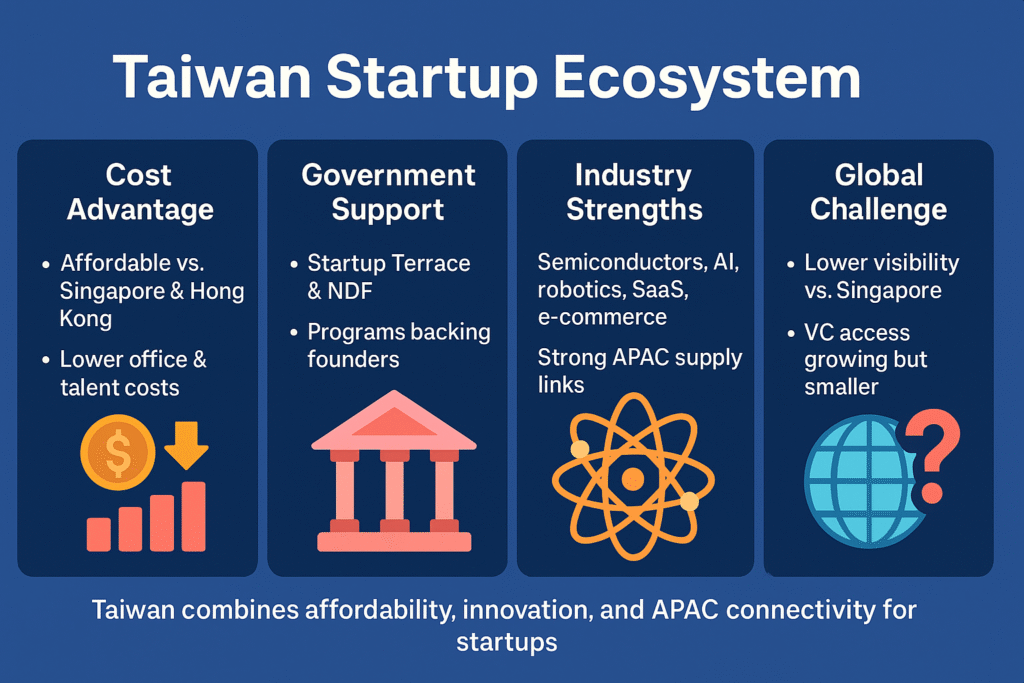
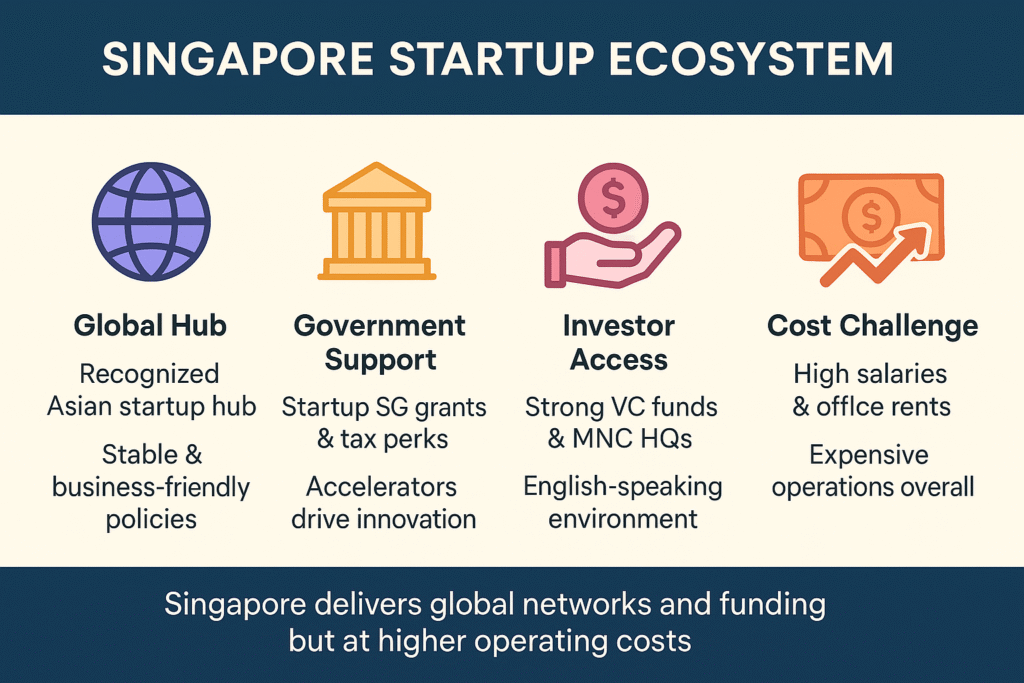
Singapore Startup Ecosystem
The Singapore startup scene remains the most internationally recognized in Asia. Known for its political stability, business-friendly policies, and strong investor presence, Singapore has become a hub for companies seeking to scale globally. Government programs such as Startup SG Founder Grant and generous tax incentives attract entrepreneurs from across the world.
For founders asking “best place for startups in Asia,” Singapore often appears first because of its reputation as a global business hub. It offers access to the regional headquarters of multinational corporations, accelerators, and significant venture capital funds. The city also provides an English-speaking environment, which makes international founders feel at ease.
The downside is cost. Incorporating a company and operating in Singapore is more expensive than in Taiwan. Salaries are high, rents are among the most expensive in Asia, and overall living costs can be a strain on early-stage startups. Despite this, companies in fintech, healthtech, and global SaaS often prioritize Singapore because of its unmatched access to funding and international networks.
Hong Kong Startup Ecosystem
The Hong Kong startup ecosystem is closely tied to its role as a financial hub. The city is known for fintech, trading, and blockchain startups. For entrepreneurs seeking to access mainland China’s market, Hong Kong offers a gateway with more streamlined financial flows and a well-established banking sector.
Government-backed initiatives like Cyberport and InvestHK have created programs to support startups, but the ecosystem faces challenges. Political uncertainties and high rents discourage some founders, making it less competitive compared to Taiwan or Singapore for cost-sensitive industries.
Still, Hong Kong appeals to those searching for “Hong Kong vs Singapore startups” when their focus is on finance. Fintech, wealth management technology, and blockchain companies view Hong Kong as a natural base due to its extensive global financial connections and experienced workforce in capital markets.

Cost of Starting a Business
For founders choosing the best place for startups in Asia, cost is often the first factor considered. Early-stage companies must strike a balance between lean budgets and access to opportunities. Taiwan, Singapore, and Hong Kong each present very different financial realities for entrepreneurs.
Taiwan Startup Costs
Startup costs in Taiwan are among the lowest in Asia’s developed ecosystems. Company incorporation fees typically range from NT$60,000 to NT$100,000 (approximately USD $2,000–$3,300). Office rents in Taipei remain significantly lower than those in Singapore or Hong Kong, with co-working spaces starting at around USD $150–250 per month. Salaries for skilled engineers and digital marketers average USD $2,200–$2,800 per month, which is significantly more affordable than Singapore’s talent market.
Living expenses are also attractive. Entrepreneurs can live comfortably in Taipei for USD $1,200–1,800 per month, covering housing, food, and transport. This makes Taiwan an appealing choice for early-stage startups aiming to conserve runway while testing ideas. Founders searching “Taiwan vs Singapore startup costs” often find Taiwan to be the most budget-friendly option without sacrificing infrastructure.
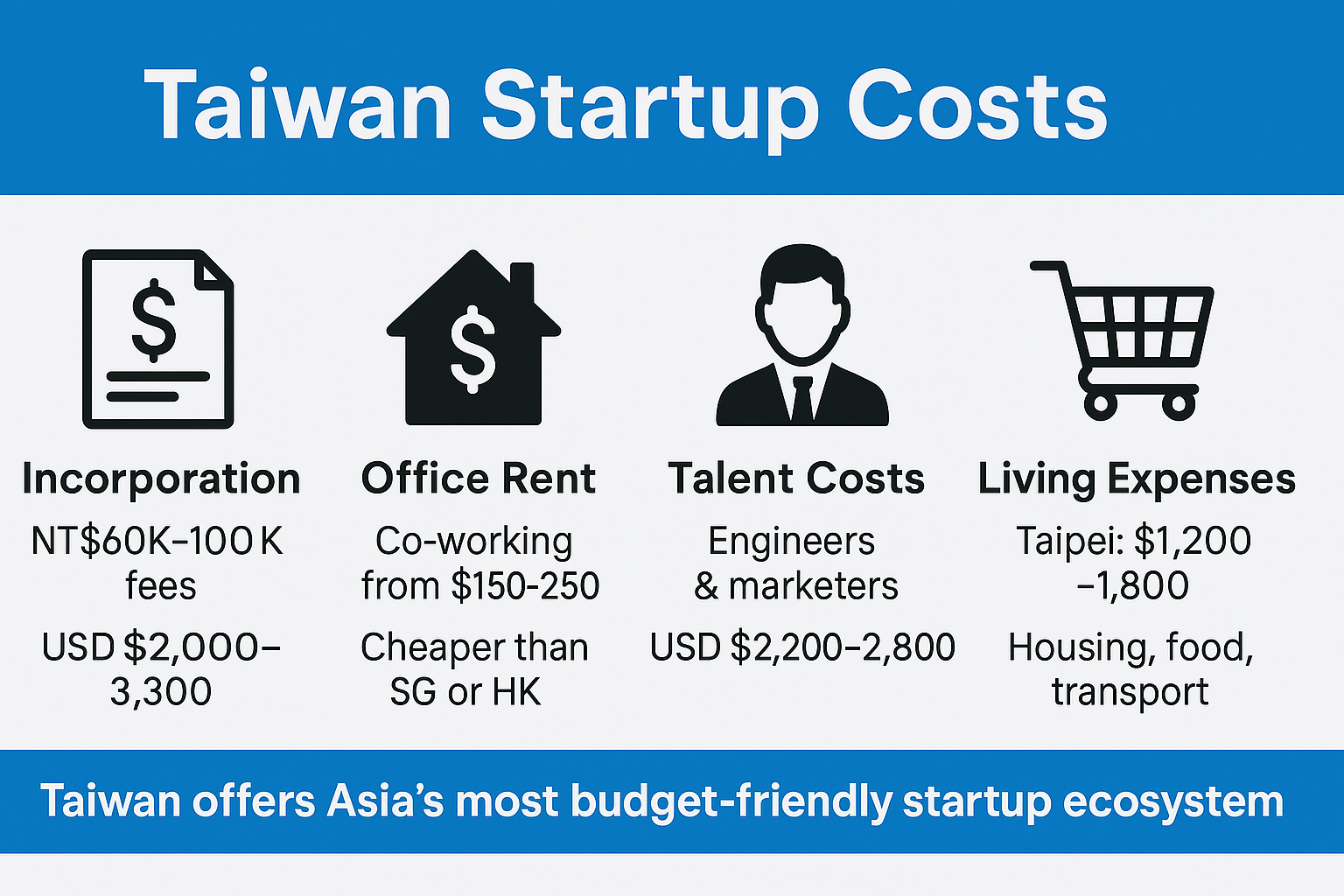
Singapore Startup Costs
The cost of starting a business in Singapore is much higher. Incorporation is straightforward and can be completed in under a week, but operational costs can add up quickly. Office space in Singapore is among the priciest in Asia, with co-working memberships ranging from USD $350 to $500 per month and dedicated office space being significantly higher.
Salaries are another significant expense. Hiring skilled software engineers or marketing professionals costs around USD $4,000–6,000 per month, nearly double the rates in Taiwan. Living in Singapore is also expensive, with monthly personal expenses averaging USD $2,500–$3,500 for housing, food, and transportation.
Despite these higher expenses, Singapore remains attractive because of its ease of doing business, international reputation, and access to venture capital funding. Many founders accept the higher costs in exchange for faster scaling opportunities.
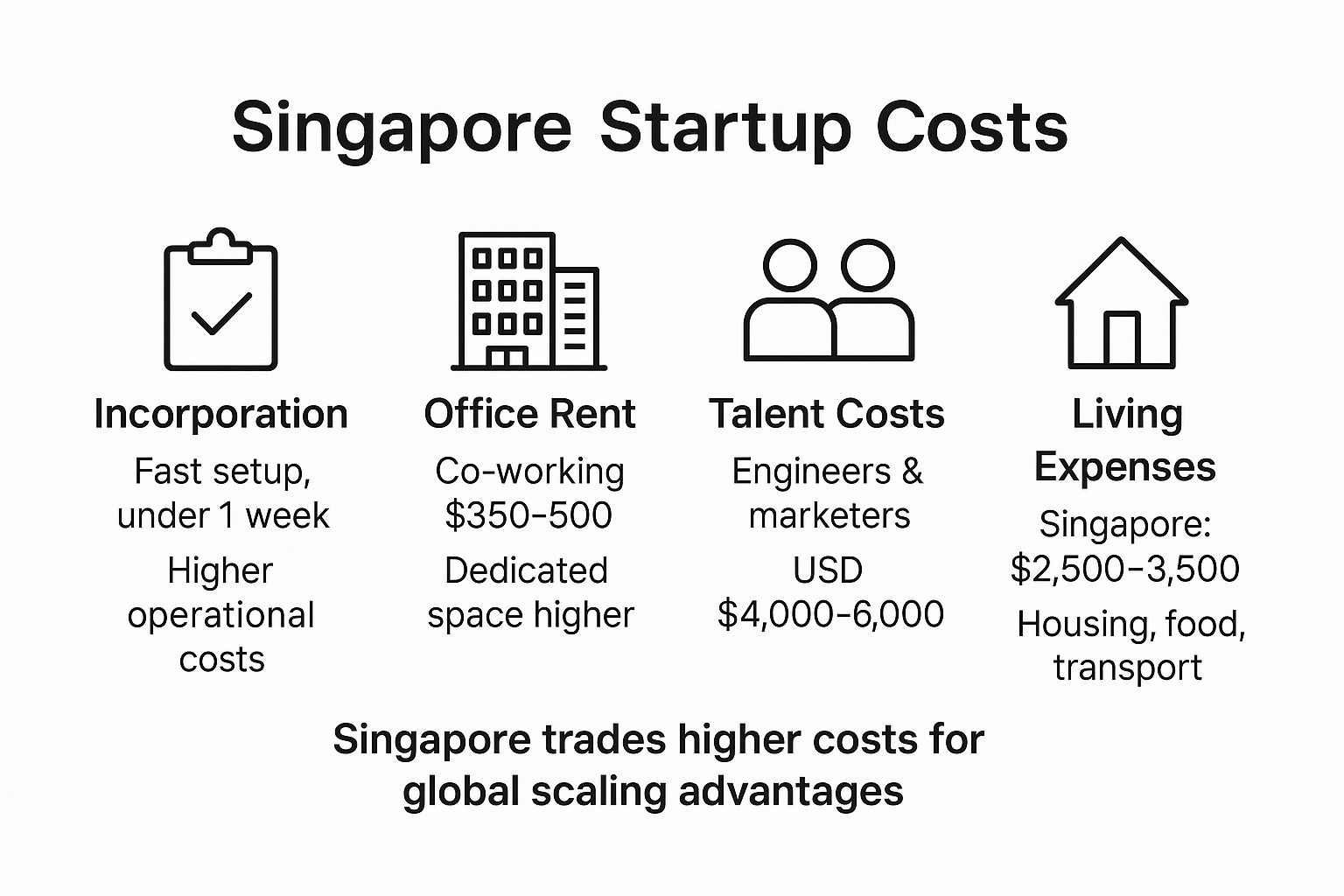
Hong Kong Startup Costs
Hong Kong startup expenses fall between those of Taiwan and Singapore, but are closer to the latter. Incorporation fees are relatively affordable, averaging USD $500–$1,000, but the real challenge lies in covering living and office costs. Office space in central Hong Kong remains expensive, with co-working desks costing USD $300–$450 per month, and apartments in the city averaging USD $2,000–$3,000 per month.
Salaries are competitive, though not as high as in Singapore. Hiring skilled talent often costs USD $3,500–4,500 per month, making it more expensive than Taiwan but slightly more affordable than Singapore. For many founders searching for “Hong Kong vs Taiwan startup costs,” Hong Kong proves costly but offers easier access to global finance and mainland China’s market.
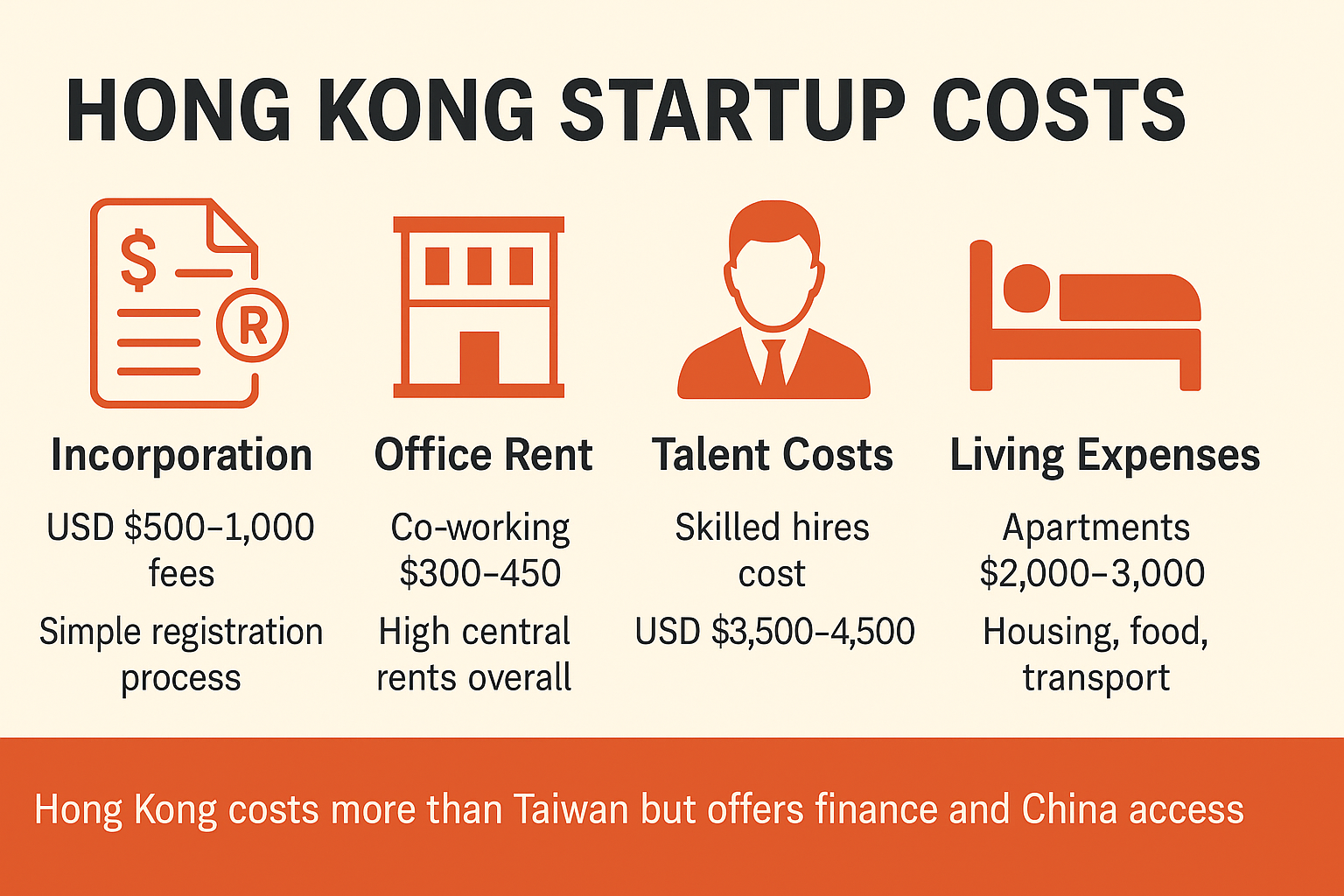
Practical View for Founders
In summary, Taiwan offers the lowest startup costs and the longest runway for early-stage founders. Singapore provides global credibility, but it requires significant capital to sustain its operations. Hong Kong is expensive, though still attractive for startups in fintech and finance. For founders prioritizing affordability, Taiwan stands out as the best launchpad, while Singapore and Hong Kong are better suited for capital-intensive industries that can absorb higher expenses.
Access to Funding and Investment
For founders comparing the best place for startups in Asia, capital availability is just as critical as the cost of living. Startups require access to early-stage grants, venture capital, and later-round investments to sustain their growth. Taiwan, Singapore, and Hong Kong each present different funding realities in 2025.
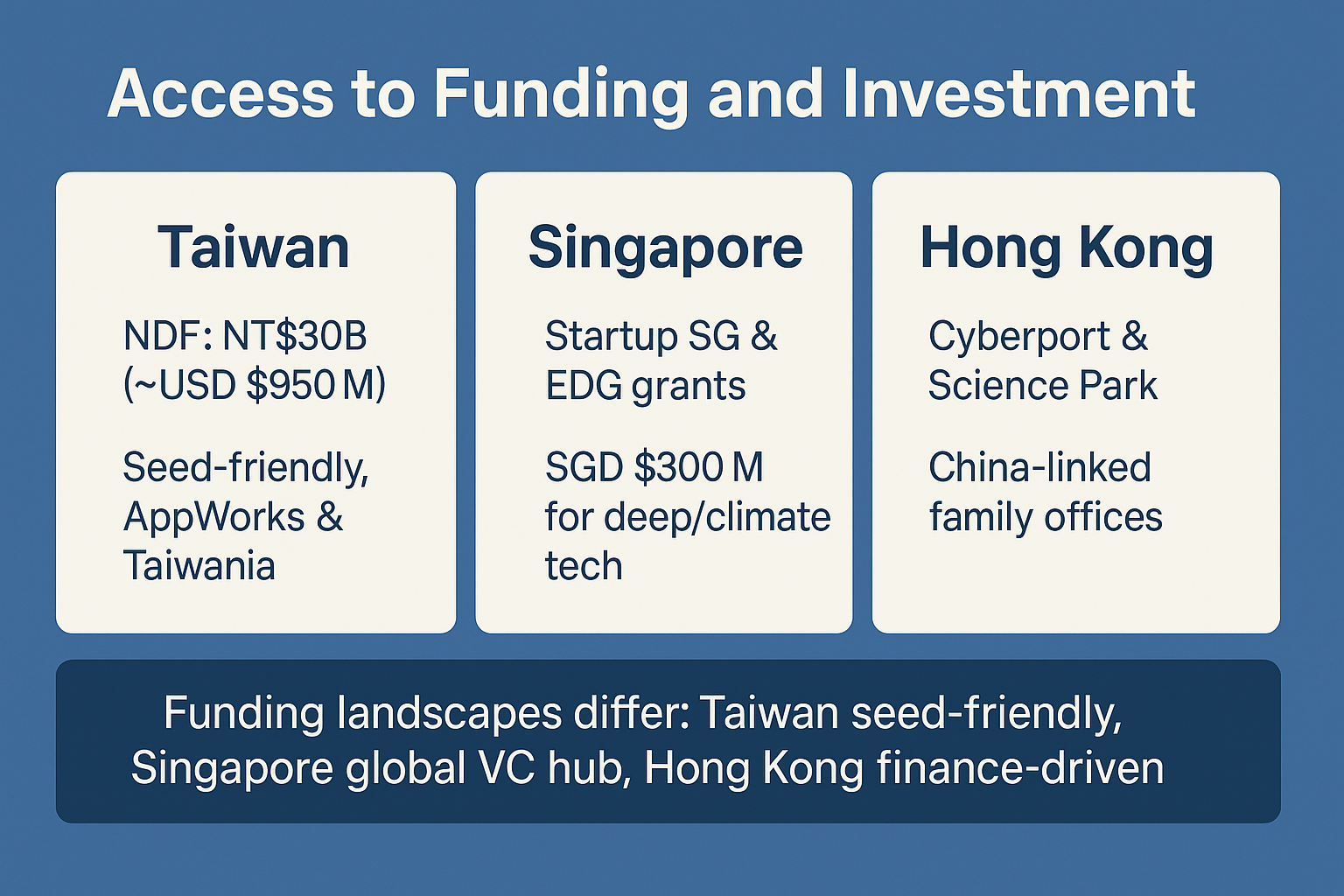
Taiwan
The Taiwan startup funding ecosystem has grown rapidly, supported by the government’s National Development Fund (NDF), which has committed more than NT$30 billion (approximately USD $950 million) to startups. Local VCs such as AppWorks and Taiwania Capital back companies in AI, biotech, and SaaS. While Taiwan has fewer mega-deals than Singapore, it is very founder-friendly at the seed stage, combining affordability with reliable government co-funding.
Singapore
The Singapore startup scene remains Asia’s leading hub for venture funding. Global firms, such as Sequoia and 500 Global, operate here, alongside homegrown funds and accelerators. Government programs such as the Startup SG Founder Grant and the Enterprise Development Grant provide SGD $50,000–100,000 in early capital. In 2025, Singapore allocated an additional SGD $300 million (approximately USD $220 million) for deep tech and climate tech ventures, further strengthening its position as the go-to hub for VC-backed scaling.
Hong Kong
The Hong Kong startup funding ecosystem remains tied to its financial services strength. Programs like Cyberport and Science Park committed more than HKD $2 billion (USD $250 million) in 2025. Hong Kong is also home to family offices and investment groups linked to mainland China, making it attractive for fintech, blockchain, and wealthtech founders. However, political uncertainties continue to push some international investors toward Singapore.
Funding Comparison Table
| Location | Strengths | Typical Support 2025 | Best Fit Industries |
|---|---|---|---|
| Taiwan | Affordable entry, gov’t co-funding | NDF: USD $950M committed | AI, SaaS, hardware, biotech |
| Singapore | Dense VC ecosystem, big grants | Grants: up to SGD $100K; +USD $220M deep tech fund | Fintech, SaaS, medtech, global scaling |
| Hong Kong | Finance-driven capital, China link | Cyberport/Science Park: USD $250M | Fintech, blockchain, wealthtech |
Talent and Workforce Availability
When founders search for the best place for startups in Asia, talent is often the deciding factor. Hiring skilled employees can make or break a startup’s growth. Taiwan, Singapore, and Hong Kong each offer unique labor markets, with differences in affordability, skill sets, and hiring processes.
Taiwan – Affordable STEM and Engineering Talent for Startups
The Taiwan startup talent pool is renowned for its strength in STEM fields, particularly engineering, semiconductors, and computer science. Universities such as National Taiwan University and National Tsinghua University produce thousands of skilled graduates each year. Salaries remain affordable compared to Singapore and Hong Kong, with software engineers averaging USD $2,200–2,800 per month.
Taiwan also benefits from a bilingual workforce, with many young professionals fluent in both Mandarin and English. This combination of affordability and skill makes Taiwan an appealing destination for startups in hardware, SaaS, and AI. For searches like “startup talent Taiwan” or “affordable workforce Asia,” Taiwan consistently ranks highly.
How aboveA Helps in Taiwan
For founders new to Taiwan, building the right hiring pipelines can be a challenge. aboveA helps startups identify and attract the best local talent through recruitment partnerships, bilingual onboarding strategies, and competitive benchmarking. We guide startups on salary expectations, talent retention practices, and how to integrate Taiwanese engineers into international teams. This ensures founders avoid common pitfalls when entering Taiwan’s labor market.
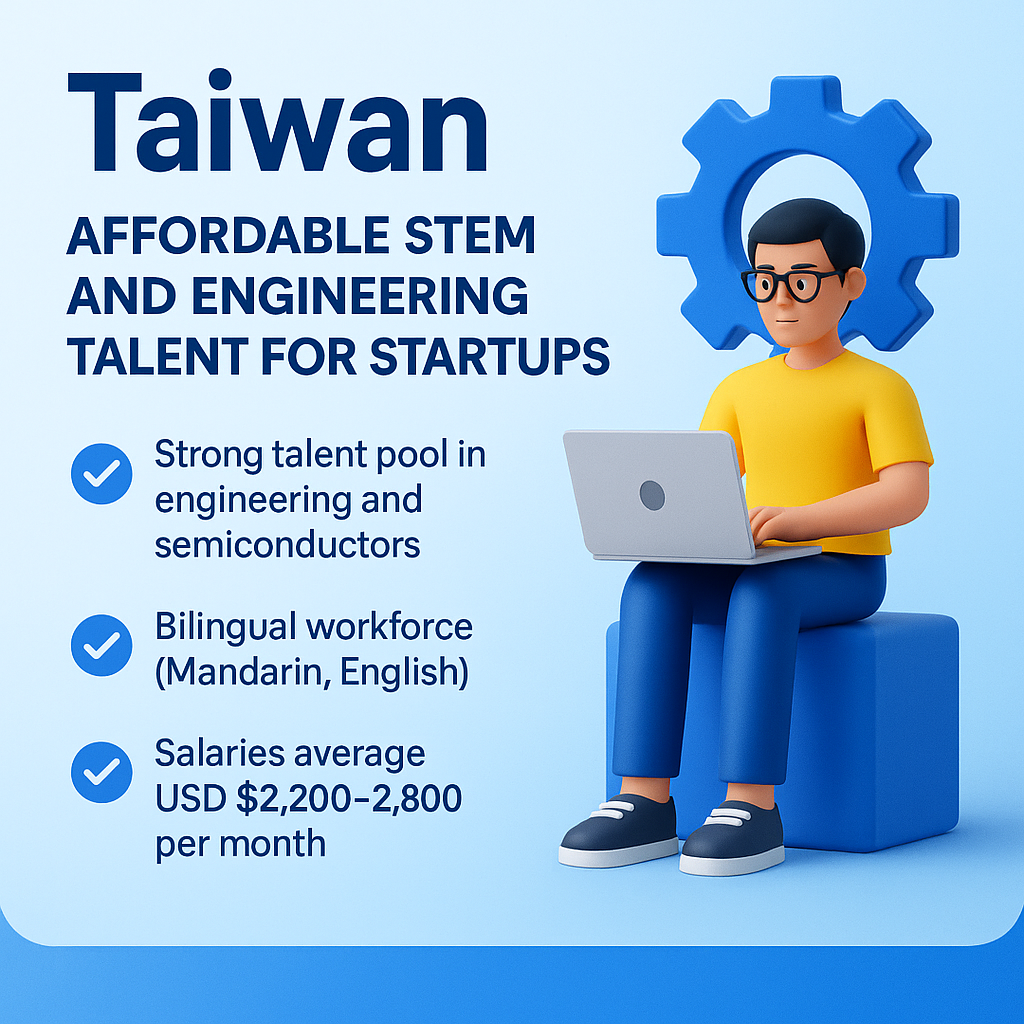
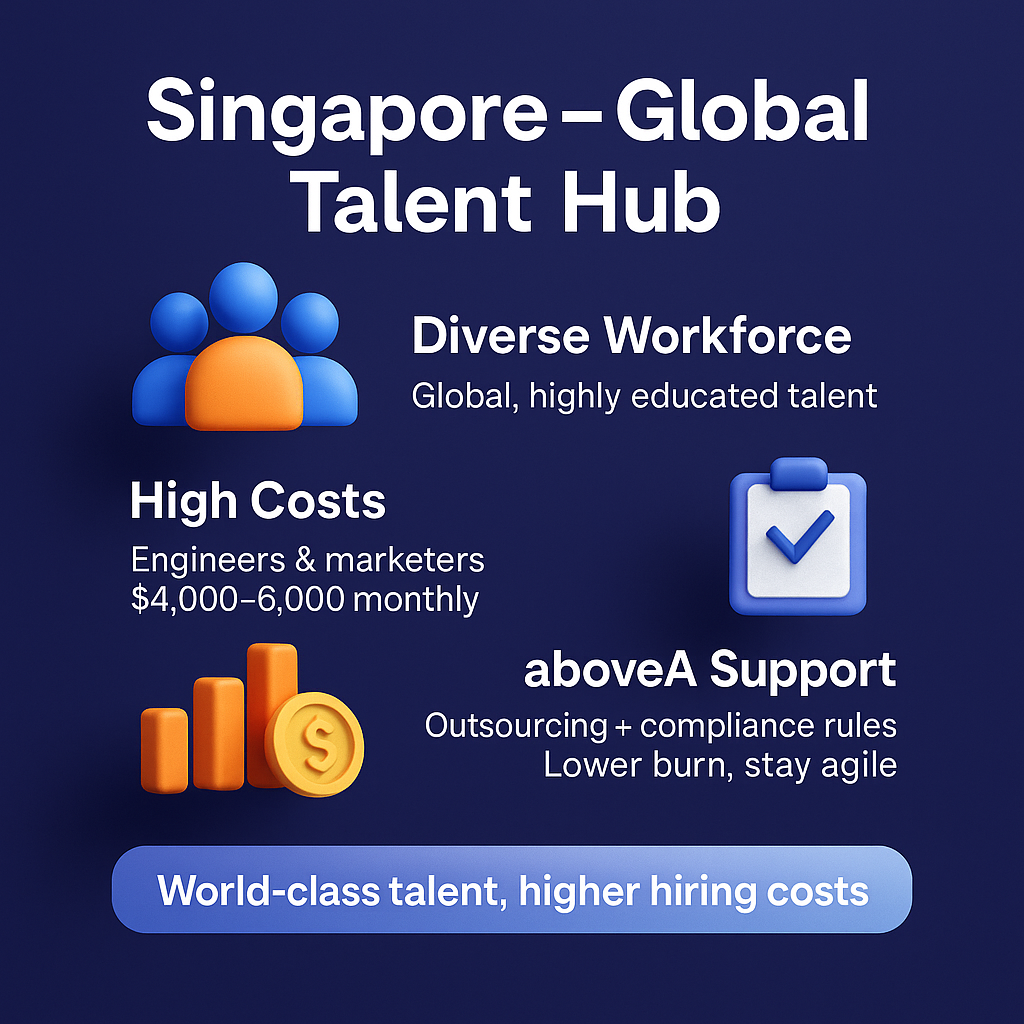
Singapore – Global Talent Hub with High Startup Hiring Costs
The Singapore startup workforce is globally diverse and highly educated. Many professionals hold degrees from leading universities, and the city attracts international talent with its reputation as a safe, global business hub. However, this talent comes at a high cost. Software engineers in Singapore typically earn USD $4,000–6,000 per month, and marketing professionals fall into similar ranges.
Singapore also enforces stricter labor regulations, including work visa requirements for foreign hires. For founders looking to attract top-tier global talent, Singapore is unmatched, but for cost-sensitive startups, the salaries can strain early-stage budgets. Search terms like “hiring in Singapore startups” or “Singapore talent costs” often highlight this trade-off.
How aboveA Helps in Singapore
High salaries and competitive recruiting in Singapore can overwhelm smaller startups. aboveA helps companies balance in-house hiring with outsourced solutions. By connecting startups with regional specialists in design, development, and marketing, we reduce burn rates while maintaining agile operations. We also assist with compliance navigation for foreign hires, ensuring startups meet Singapore’s labor regulations without delays.
Hong Kong – Finance-Focused Workforce with Limited Tech Talent
The Hong Kong startup workforce is traditionally strong in finance, trading, and legal services, reflecting the city’s role as a financial hub. Tech talent exists but is less abundant than in Taiwan or Singapore, which can make hiring engineers more competitive. Salaries for skilled workers average USD $3,500–4,500 per month, placing Hong Kong between Taiwan’s affordability and Singapore’s high costs.
For startups focused on fintech or cross-border trade, Hong Kong offers domain-specific expertise. However, the smaller tech talent pool means startups may need to recruit from mainland China or Southeast Asia to fill technical roles. Searches like “startup workforce Hong Kong” or “talent pool Hong Kong startups” highlight this challenge.
How aboveA Helps in Hong Kong
In Hong Kong, startups frequently face a shortage of local engineers and product specialists. aboveA helps bridge this gap by offering remote team integration, talent sourcing across APAC, and cross-border hiring support. For finance-driven startups, we also provide strategies to balance local finance talent with offshore technical teams. This approach helps founders scale efficiently without being limited by Hong Kong’s smaller tech pool.
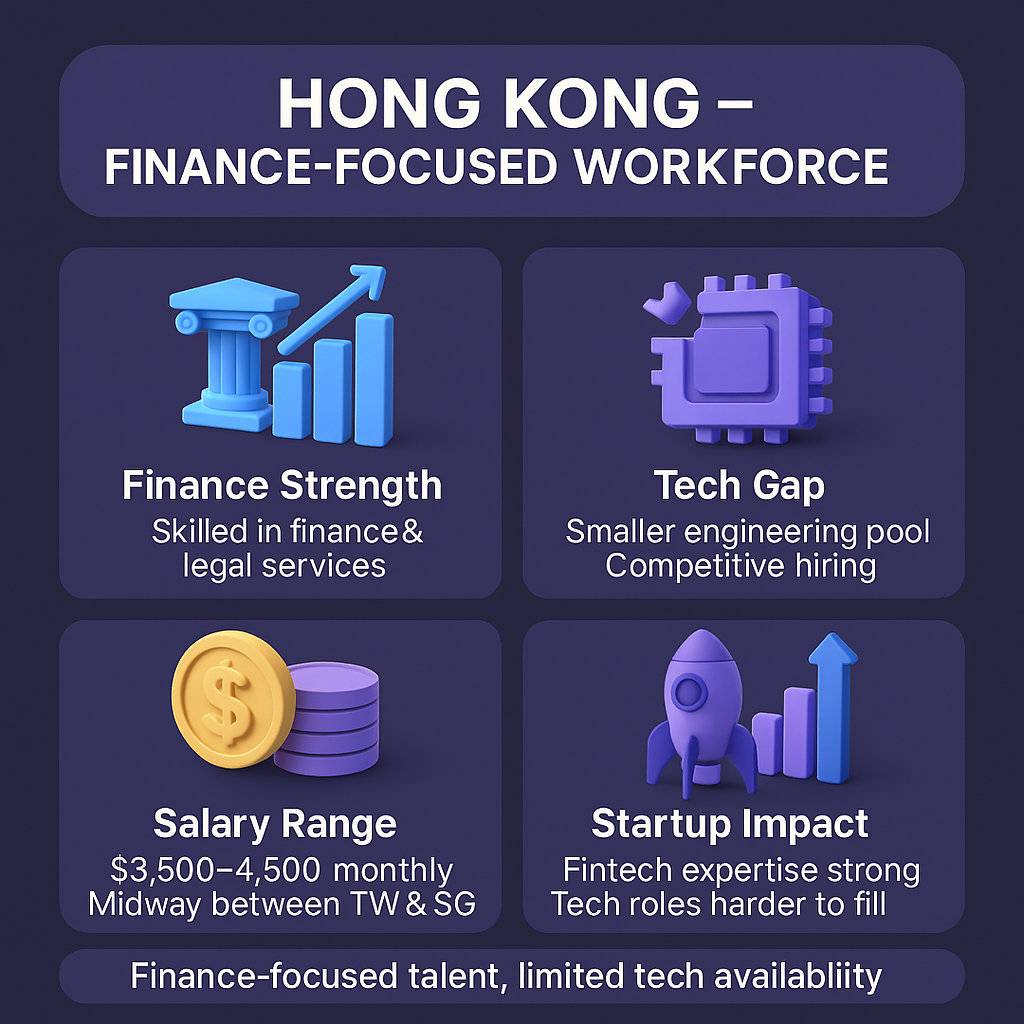
Infrastructure and Business Environment
A startup hub is only as strong as its infrastructure and overall business climate. Founders looking for the best place for startups Asia must evaluate not just costs and funding, but also connectivity, logistics, and long-term business stability. Taiwan, Singapore, and Hong Kong each bring unique advantages to the table.
Taiwan – Strong Hardware Infrastructure and Manufacturing Support
Taiwan’s infrastructure is closely tied to its global role in semiconductors and advanced manufacturing. Startups in hardware, IoT, and robotics benefit from being part of one of the most efficient supply chains in Asia. The island has modern co-working hubs, growing innovation districts such as Startup Terrace, and well-developed digital infrastructure with widespread 5G coverage.
Taiwan’s business environment is attractive to startups looking for cost-effective logistics and technical partnerships with hardware giants like TSMC or Foxconn. For searches like “Taiwan infrastructure for startups” or “manufacturing ecosystem Taiwan,” the country consistently ranks as a strong base for product-driven founders.
Singapore – Business-Friendly Regulations and Global Connectivity
The Singapore business environment is one of the most favorable in the world. Ranked consistently as a top place for ease of doing business, Singapore offers efficient company incorporation, transparent regulations, and world-class logistics. Its infrastructure includes top-tier financial systems, digital innovation parks, and strong connectivity as a gateway to Southeast Asia.
For startups in fintech, SaaS, and healthtech, Singapore provides unmatched regional HQ opportunities. Its business climate attracts multinational corporations and global accelerators, creating strong networking possibilities. Founders searching “business environment Singapore startups” or “best startup hub Asia” often find Singapore leading because of its mix of legal stability and global access.
Hong Kong – Financial Center with Global Trade Infrastructure
The Hong Kong startup environment is heavily influenced by its role as a global financial hub. The city offers strong financial systems, international banking access, and advanced logistics infrastructure that supports trade and cross-border commerce. Hong Kong is especially attractive for startups in fintech, asset management tech, and logistics platforms.
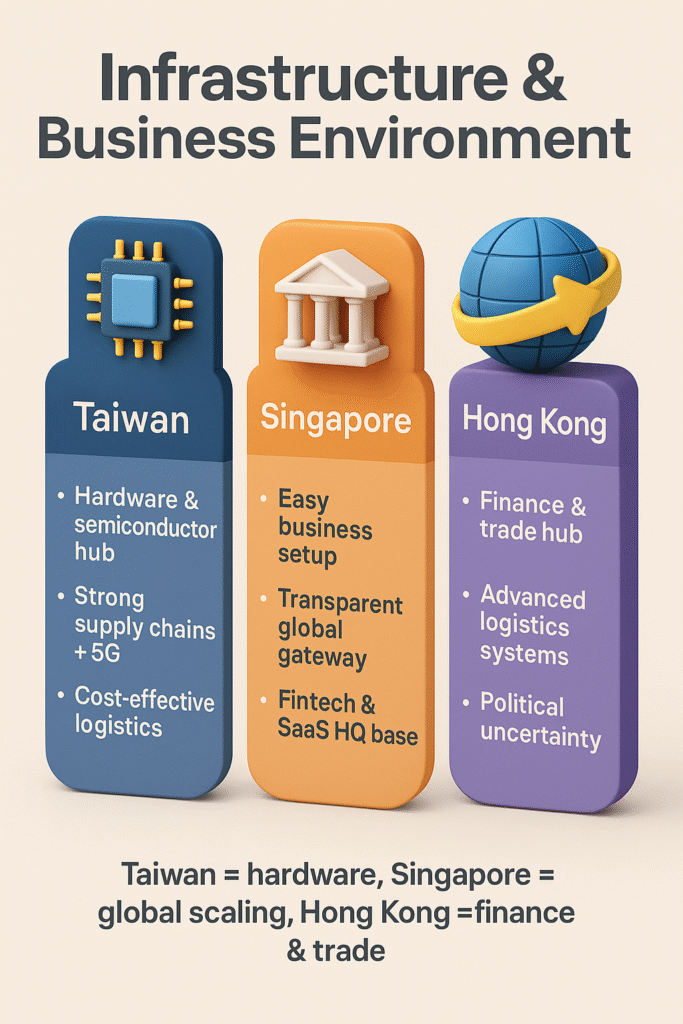
However, political and economic uncertainties have created challenges, with some companies choosing Singapore as a more stable alternative. Despite this, Hong Kong remains a powerful option for founders aiming to bridge China market access with global operations. Search terms like “Hong Kong business climate” and “startup logistics Hong Kong” highlight its dual strengths and challenges.
Government Support and Incentives
Government programs often determine whether a startup thrives or struggles in its early stages. Founders exploring the best place for startups Asia should compare how Taiwan, Singapore, and Hong Kong support entrepreneurs through grants, tax breaks, and dedicated startup initiatives.
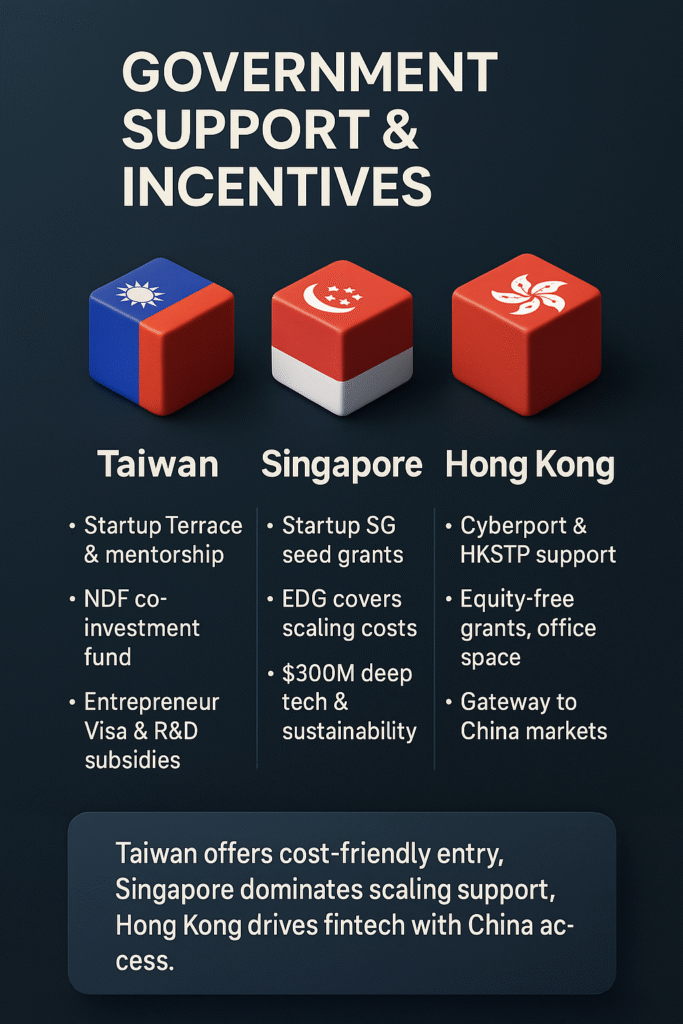
Taiwan – Startup Terrace, Visas, and R&D Funding
The Taiwan government startup support system has expanded in recent years. Programs like Startup Terrace provide subsidized office space and mentorship for early-stage companies. The National Development Fund (NDF) co-invests alongside venture capital firms, creating a safety net for founders raising seed and Series A rounds.
Taiwan also offers the Entrepreneur Visa, which allows foreign founders to establish operations more easily, as well as R&D subsidies for high-tech startups. For founders searching “Taiwan startup visa” or “Taiwan government funding startups,” these programs stand out as accessible and cost-friendly options compared to Singapore’s higher-entry programs.
Singapore – Grants and Tax Incentives for Scaling
The Singapore government startup programs are among the most comprehensive in Asia. The Startup SG Founder Grant offers SGD $50,000–100,000 in seed capital, while the Enterprise Development Grant (EDG) supports scaling by covering up to 70% of qualifying expenses. Tax incentives further reduce costs, making Singapore particularly appealing to startups in fintech, biotech, and SaaS.
In 2025, Singapore also allocated an additional SGD $300 million (USD $220 million) to support deep tech and sustainability startups. For founders searching “government support Singapore startups” or “Singapore startup grants 2025,” the city emerges as the strongest destination for well-capitalized companies aiming for regional leadership.
Hong Kong – Cyberport, InvestHK, and Mainland Gateway
The Hong Kong startup incentives are centered around Cyberport and the Hong Kong Science and Technology Parks (HKSTP). These programs provide equity-free grants, office space, and connections to investors. InvestHK also runs support initiatives for foreign entrepreneurs, positioning Hong Kong as a launchpad for scaling into China.
In 2025, Cyberport announced funding packages worth more than HKD $2 billion (USD $250 million) to nurture digital and fintech startups. However, compared to Singapore, access to grants is less diversified, and political uncertainty remains a challenge. Still, for founders searching “Hong Kong startup grants” or “InvestHK programs,” the city offers attractive support, particularly for fintech and blockchain ventures.
Comparative View of Startup Incentives in Asia’s Top Hubs
For founders comparing the best place for startups Asia, government incentives can often tilt the decision. While each hub has unique strengths, side-by-side analysis helps highlight which location aligns best with a startup’s needs. The table below compares startup grants, tax breaks, and visa options in Taiwan, Singapore, and Hong Kong.
| Location | Key Grants / Funds | Tax Incentives | Visa Options | Best Fit Startups |
|---|---|---|---|---|
| Taiwan | National Development Fund (USD $950M co-fund), Startup Terrace subsidies | R&D subsidies, reduced corporate tax for innovation projects | Entrepreneur Visa for foreign founders | Hardware, semiconductors, AI, SaaS |
| Singapore | Startup SG (SGD $50K–100K), Enterprise Development Grant, $220M deep tech fund | 17% corporate tax with exemptions, tax credits for R&D and IP | EntrePass Visa for entrepreneurs | Fintech, medtech, biotech, SaaS scaling |
| Hong Kong | Cyberport Creative Micro Fund, HKSTP incubation, $250M Cyberport packages | Low 16.5% corporate tax, no VAT, no capital gains tax | InvestHK programs, entrepreneur visa pathways | Fintech, blockchain, cross-border trade |
This breakdown shows Taiwan as the affordable early-stage option, Singapore as the scaling powerhouse with unmatched grant diversity, and Hong Kong as the finance gateway with low taxes and access to China.
Market Access and Regional Expansion
When founders ask about the best place for startups Asia, they often think beyond setup costs. The true value lies in how each hub enables regional growth and international expansion. Taiwan, Singapore, and Hong Kong each offer different access points to Asia’s booming markets.
Taiwan – Gateway to Supply Chains and R&D
Taiwan’s ecosystem is tied to manufacturing and semiconductors, giving startups unique access to global supply chains. Hardware, IoT, and AI companies find Taiwan a cost-efficient base for regional product development.Singapore – Southeast Asia’s Launchpad
Known as a global HQ city, Singapore connects startups to Southeast Asia’s 650+ million consumers. Fintech, SaaS, and healthtech firms use Singapore to scale quickly across SEA markets.Hong Kong – Direct Access to Mainland China
Hong Kong’s role as a financial hub makes it ideal for startups targeting mainland China. Fintech, blockchain, and e-commerce companies leverage its trade systems for cross-border expansion.
For founders searching “market access Asia startups” or “Taiwan vs Singapore startup expansion,” the choice depends on industry. Taiwan suits product-driven companies, Singapore scales service-based ventures, and Hong Kong opens financial and China-focused doors.
Founder Lifestyle and Community
The best place for startups in Asia isn’t only about funding and costs; daily life and networks also matter.
In Taiwan, the founder lifestyle is affordable, with monthly living costs ranging from USD $1,200 to $1,800. A growing yet close-knit startup community gathers in hubs like Startup Terrace and Taipei Tech Arena, making it an attractive destination for early-stage founders seeking balance and collaboration.
Singapore offers unmatched international exposure, with global conferences and strong investor networks. However, the founder life in Singapore is expensive, with personal costs often exceeding USD $2,500–3,500 monthly. Still, its startup community is diverse, offering easy access to top-tier talent and capital.
Hong Kong delivers a fast-paced, finance-driven lifestyle. Founders pay an average of USD $2,000–3,000 monthly but gain proximity to banks, investors, and fintech hubs like Cyberport. For those targeting China, the Hong Kong entrepreneur community remains a powerful entry point.
Comparative Table of Key Metrics
When comparing the best place for startups in Asia, numbers often tell the clearest story. Taiwan, Singapore, and Hong Kong each have unique strengths, but the table below highlights their main differences for founders making strategic decisions in 2025.
| Factor | Taiwan | Singapore | Hong Kong |
|---|---|---|---|
| Startup Costs | Incorporation USD $2,000–3,300; low rent | Incorporation USD $250–400; high rent/living | Incorporation USD $500–1,000; high rent |
| Talent Costs | Engineers USD $2,200–2,800/month | Engineers USD $4,000–6,000/month | Engineers USD $3,500–4,500/month |
| Funding Access | Strong early-stage gov’t support; smaller VC pool | Dense VC ecosystem, global grants up to USD $220M | Finance-driven funding; family offices, China ties |
| Infrastructure | Strong in semiconductors, AI, hardware | World-class logistics, regional HQ hub | Global finance, strong logistics trade base |
| Lifestyle Costs | USD $1,200–1,800/month (affordable) | USD $2,500–3,500/month (expensive) | USD $2,000–3,000/month (high) |
| Best Fit | Product-driven startups, R&D, affordable scaling | Fintech, SaaS, medtech, global expansion | Fintech, blockchain, China-focused ventures |
This comparison highlights Taiwan as the most cost-effective base for early-stage founders, Singapore as the leader in funding and scale-up, and Hong Kong as the gateway for finance. The best choice depends on industry focus, budget, and long-term market goals.
Final Analysis – Which is Better for Startups?
Founders exploring the best place for startups Asia often face a tough choice between Taiwan, Singapore, and Hong Kong. Each location has clear advantages, and the right decision depends on industry, budget, and long-term vision.
Taiwan stands out as the most affordable startup hub. With low incorporation fees, accessible STEM talent, and strong manufacturing support, it is ideal for hardware, AI, SaaS, and biotech companies. Taiwan also offers government programs like the National Development Fund and Startup Terrace, which provide co-funding and subsidized resources. For early-stage founders searching “Taiwan vs Singapore startup costs,” Taiwan offers the longest financial runway while still giving access to global supply chains.
Singapore dominates as Asia’s scaling powerhouse. Its dense venture capital ecosystem, strong government grants, and reputation as a regional HQ make it the first choice for startups in fintech, SaaS, medtech, and sustainability. However, high operating costs mean founders must secure strong funding to survive. For those searching “startup funding Singapore 2025,” the city consistently emerges as the top option for companies ready to scale internationally.
Hong Kong remains a strategic finance gateway. With direct links to mainland China, a strong fintech community, and programs like Cyberport and InvestHK, Hong Kong is attractive for blockchain, asset management, and cross-border trade startups. Yet, its high rents and smaller tech talent pool make it less favorable for product-driven startups compared to Taiwan.
In short, Taiwan is best for early-stage and product-focused ventures, Singapore excels at scaling and global expansion, and Hong Kong works for finance-driven startups. The “winner” depends entirely on your startup’s sector and growth model.
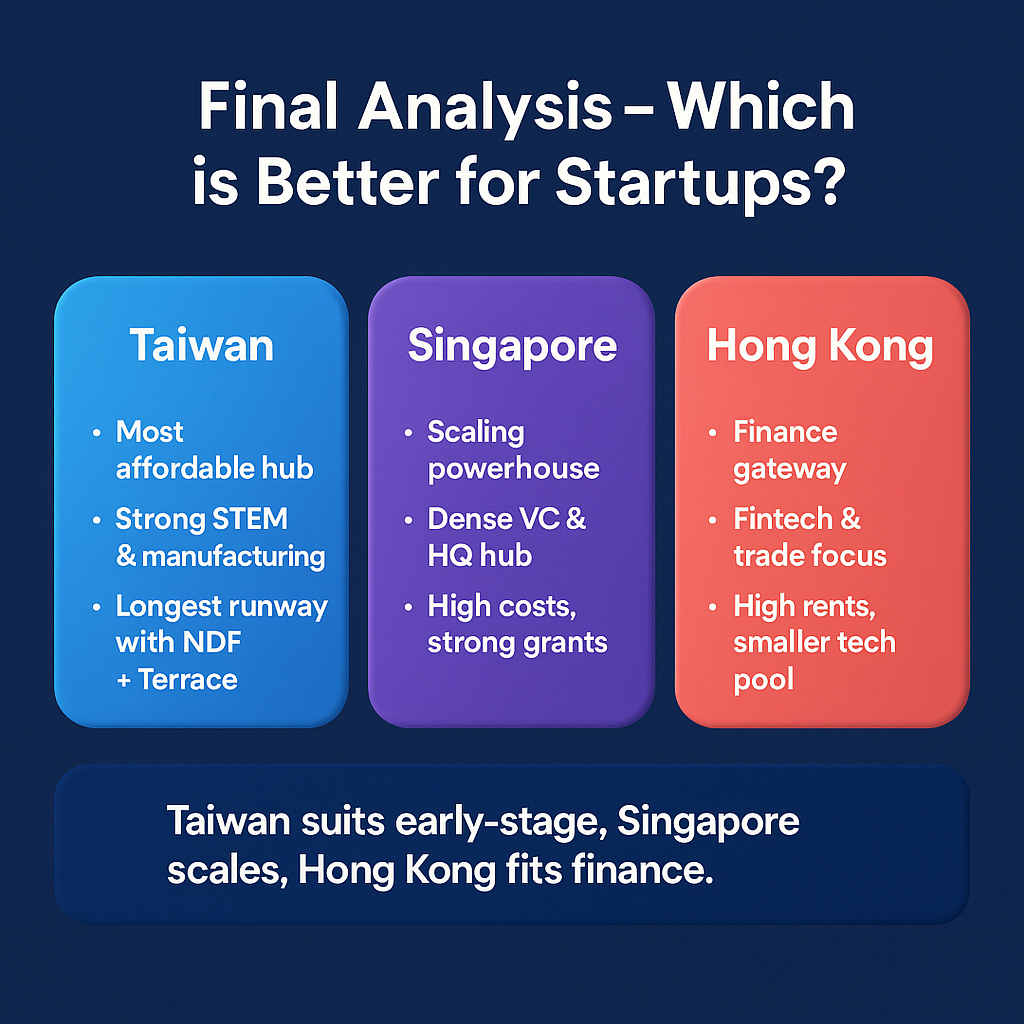
Conclusion
The best place for startups Asia depends on what founders need most. Taiwan offers affordability and strong STEM talent, Singapore leads in funding and scale, while Hong Kong excels in finance and China access. Each hub has distinct advantages, from low costs to global visibility. For early-stage ventures, Taiwan provides long runway and product development. For VC-backed growth, Singapore offers unmatched international exposure. For fintech and trade, Hong Kong remains relevant. Choosing wisely means aligning startup goals with each ecosystem’s strengths, ensuring sustainable growth in Asia’s competitive landscape.
Frequently Asked Questions
1. Which is the cheapest place to start a business: Taiwan, Singapore, or Hong Kong?
Taiwan is the most affordable, with low incorporation fees, cheaper office rents, and accessible STEM talent. Singapore and Hong Kong are costlier but offer stronger investor access.
2. Which hub offers the best venture capital opportunities in Asia?
Singapore leads in venture capital with dense networks of global VCs, accelerators, and government grants. Taiwan and Hong Kong provide targeted support but smaller funding ecosystems.
3. How does government support compare between Taiwan, Singapore, and Hong Kong?
Singapore offers the most diverse grants and tax incentives, Taiwan provides strong R&D co-funding, and Hong Kong supports fintech through Cyberport and InvestHK programs.
4. How should founders decide between Taiwan, Singapore, and Hong Kong?
The choice depends on budget, industry, and growth goals. Taiwan suits affordable R&D, Singapore suits global scaling, and Hong Kong suits fintech or China-focused expansion.

